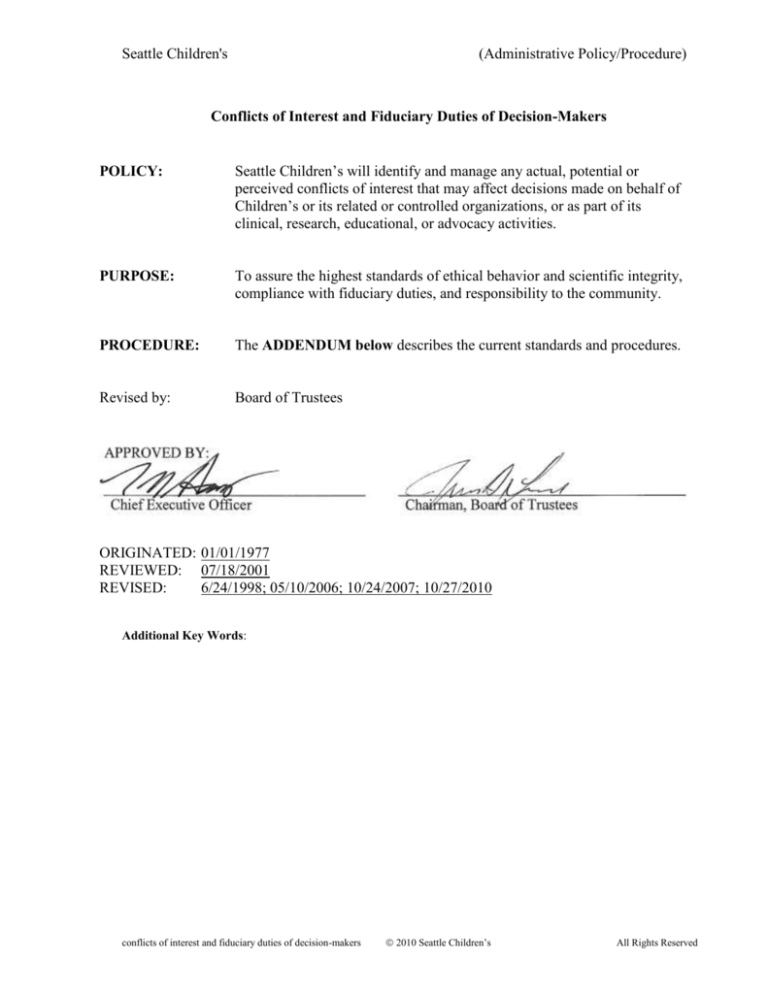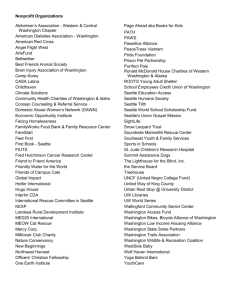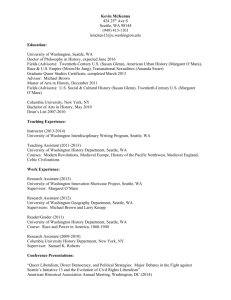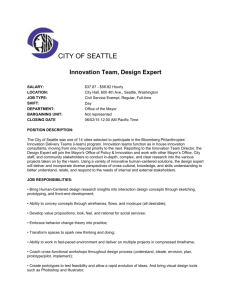
Seattle Children's
(Administrative Policy/Procedure)
Conflicts of Interest and Fiduciary Duties of Decision-Makers
POLICY:
Seattle Children’s will identify and manage any actual, potential or
perceived conflicts of interest that may affect decisions made on behalf of
Children’s or its related or controlled organizations, or as part of its
clinical, research, educational, or advocacy activities.
PURPOSE:
To assure the highest standards of ethical behavior and scientific integrity,
compliance with fiduciary duties, and responsibility to the community.
PROCEDURE:
The ADDENDUM below describes the current standards and procedures.
Revised by:
Board of Trustees
ORIGINATED: 01/01/1977
REVIEWED: 07/18/2001
REVISED:
6/24/1998; 05/10/2006; 10/24/2007; 10/27/2010
Additional Key Words:
conflicts of interest and fiduciary duties of decision-makers
2010 Seattle Children’s
All Rights Reserved
Page 2:Administrative Policy/Procedure: Conflicts of Interest and Fiduciary Duties of Decision-Makers
ADDENDUM:
I.
Covered Persons. This Policy applies to the following individuals, who are called
“Covered Persons” in this Policy:
A.
Trustees, officers, and members of committees of the following entities:
1.
Seattle Children’s Hospital (SCH)
2.
Seattle Children’s Healthcare System (SCHS)
3.
Seattle Children’s Hospital Foundation
4.
Seattle Children’s Hospital Guild Association
5.
Any other entity that is part of the Seattle Children’s health care system, as
determined by the SCHS Board of Trustees;
B.
Any employee of any entity listed in section I.A above holding a position of
“Director” or higher;
C.
Members of the Medical Staff of SCH who hold an appointment as Department
Director or Division Chief, and all members of the Medical Staff Medical
Executive Committee;
D.
Members and staff of any SCH Institutional Review Board or equivalent
organization;
E.
Any employee of SCH or faculty member of another institution who is engaged in
research at facilities owned, leased or operated by SCH and who contributes to the
design, conduct or reporting of research;
F.
Members of the SCH Pharmacy and Therapeutics Committee.
G.
In addition, the officers of any Guild required to file IRS Form 990 will provide
information necessary to complete the Form 990, but are not otherwise subject to
this Policy.
II.
Duties of Covered Persons.
A.
Duty of Care. Every Covered Person shall discharge her or his duties in good faith
and with the degree of care that ordinarily prudent person in a like position would
exercise under similar circumstances.
B.
Duty of Loyalty. Every Covered Person must act with loyalty to Seattle
Children’s. No Covered Person may use his or her corporate position to make
personal profit or gain other personal advantage. Covered Persons may not engage
in transactions with Seattle Children’s that confer unfair gains or secret profits.
Any business relationship with a Covered Person shall be subject to approval
without any participation by the affected Covered Person or Persons. Covered
Persons may not personally take advantage of a business opportunity that is offered
to Seattle Children’s, or to the Covered Person by virtue of his or her position with
Seattle Children’s, unless the Board determines (after a disinterested and informed
evaluation) not to pursue that opportunity.
C.
Confidentiality. No Covered Person or any other employee shall disclose any
information related to Seattle Children’s business to any person or entity unless
disclosure is related to the legitimate business of Seattle Children’s. Each Covered
Person will annually sign a Nondisclosure and Confidentiality Statement in a form
approved by General Counsel.
D.
Conflicts of Interest. Covered Persons may not engage in transactions or
undertake positions with other organizations that involve a Financial Interest (as
conflicts of interest and fiduciary duties of decision-makers
2010 Seattle Children’s
All Rights Reserved
Page 3:Administrative Policy/Procedure: Conflicts of Interest and Fiduciary Duties of Decision-Makers
E.
III.
defined in this Policy) without prior disclosure to Seattle Children’s and approval
by disinterested and informed members of the Board (in cases where the Covered
Person is a trustee) or management (in cases where the Covered Person is not a
trustee). The process for evaluating and managing conflicts of interest is described
in detail below.
Limited Prohibition on Gifts.
1.
No Covered Person or any other employee shall accept any gift,
entertainment, or other favor where such acceptance might create the
appearance of influence on the Covered Person or employee in the
performance of his or her duties. No Covered Person or any other
employee shall receive, accept, take, seek, or solicit, directly or indirectly,
anything of economic value as a gift, gratuity, or favor from a person if it
could reasonably be expected that the gift, gratuity or favor would
influence, or would appear to influence, the vote, action or judgment of the
Covered Person or other employee, or be considered as part of a reward for
action or inaction.
2.
The acceptance of any gift, entertainment, or other favor from an entity
selling goods or services to Seattle Children’s presents the appearance of
influencing a Covered Person or employee. No Covered Person or any
other employee involved in the acquisition of goods or services shall accept
any gift, irrespective of value, from any person or entity providing goods or
services within the Covered Person or other employee’s scope of
responsibility.
3.
No Covered Person or any other employee may accept any gift of cash or a
cash equivalent (such as a gift card) from any person.
4.
A Covered Person or a Seattle Children’s employee may accept:
a.
Gifts from patients of no more than nominal value (though
acceptance of such gifts is discouraged);
b.
Unsolicited advertising or promotional items of nominal value, such
as pens and note pads (though acceptance of such gifts is
discouraged);
c.
Unsolicited tokens or awards of appreciation in the form of a plaque,
trophy, desk item, wall memento, or similar items; and
d.
Informational material, publications or subscriptions related to the
recipient’s performance of official duties.
Financial Interest. A financial interest (for purposes of this Policy, a Financial Interest)
exists whenever:
A.
A Covered Person has, directly or indirectly, through business, investment or
family:
1.
An ownership or investment interest in any entity with which Seattle
Children’s has a business relationship,
2.
A compensation arrangement with Seattle Children’s or with any entity or
individual with which SCH has a business relationship,
3.
A relationship where the Covered Person receives any remuneration
from any other entity;
conflicts of interest and fiduciary duties of decision-makers
2010 Seattle Children’s
All Rights Reserved
Page 4:Administrative Policy/Procedure: Conflicts of Interest and Fiduciary Duties of Decision-Makers
a.
B.
IV.
V.
Remuneration includes stock ownership, stock options, equity
interests, stock warrants, royalties, consulting fees, loans, and
speaker fees;
b.
In the case of a Covered Person listed in sections I.C. through I.F
above, remuneration does not include any amounts received from
the University of Washington, Children’s University Medical
Group, Seattle Cancer Care Alliance, or Fred Hutchison Cancer
Research Center;
4.
A potential ownership or investment interest in, or compensation
arrangement with, or relationship involving receipt of any
rermuneration from, any entity or individual with which Seattle Children’s
is negotiating a business relationship;
5.
Authority or influence with respect to any such entity’s business
relationship; or
6.
A Covered Person, directly or indirectly, through business, investment or
family, has an ownership interest in any competing entity having a value
in excess of 10% of the net worth of such entity or the Covered Person has a
position with any competing entity that confers decision-making authority
influence with respect to such entity;
7.
For purposes of section III.A., owning less than 10% of the securities (or of
securities representing less than 10% of the net worth) of a publicly traded
entity does not present a conflict of interest so long as the fair market value
of the interest is less than (i) 10% of the Covered Person’s net worth at year
end, or (ii) the Covered Person’s annual income;
A Covered Person has accepted any gift, entertainment, or other favor in
violation of this Policy.
Disclosure.
A.
A Covered Person shall disclose to Seattle Children’s (as described below):
1.
Any Financial Interest:
a.
That exists at the time an individual becomes a Covered Person;
b.
That arises while an individual is a Covered Person; and
c.
Annually through a Conflict of Interest survey.
2.
Any business relationship between a Covered Person and any person or
entity with which Seattle Children’s has a business relationship; and
3.
Any entity in which a Covered Person holds office or serves on the board of
directors, or holds any similar position.
B.
When engaged in teaching, research or publication activities, a Covered Person
shall disclose to the audience any Financial Interest related to the activity, and also
any gifts, grants or other financial support received in connection with the activity.
Disclosure may be through written materials, verbal statements, or informational
slides.
Process for Disclosure. A Covered Person shall:
A.
Disclose any Financial Interest existing at the time an individual becomes a
Covered Person, immediately upon becoming a Covered Person;
conflicts of interest and fiduciary duties of decision-makers
2010 Seattle Children’s
All Rights Reserved
Page 5:Administrative Policy/Procedure: Conflicts of Interest and Fiduciary Duties of Decision-Makers
B.
C.
VI.
Disclose any Financial Interest arising while a Covered Person, immediately upon
the existence of the Financial Interest;
Annually complete and submit to the General Counsel a survey on Financial
Interests, in such form as the General Counsel determines is necessary and
appropriate to accomplish the purposes of this Policy and any other requirements of
applicable law or regulation, and which survey may be in electronic or print format,
as appropriate.
Evaluation and Management of Disclosures. The General Counsel shall review all
disclosures to determine if a management plan for the interest disclosed is necessary or
advisable to meet the purposes of this Policy. The following procedures shall apply to
management plans for disclosed interests:
A.
Covered Person is Trustee: Where the Covered Person is a Seattle Children’s
trustee, the General Counsel will inform the Chairman of the Board of Trustees of
the existence of the Financial Interest, and shall create a management plan
requiring the affected trustee not to participate in any discussion of or decision
regarding the Financial Interest disclosed. Where the Covered Person is the
Chairman of the Board of Trustees, the General Counsel will similarly inform the
Chairman of the Audit and Corporate Responsibility Committee. If the Chairman
of the Board, or the Chairman of the Audit and Corporate Responsibility
Committee, as the case may be, determines that additional steps are necessary in
the circumstances to meet the purposes of this Policy, she or he shall refer the
matter to the Audit and Corporate Responsibility Committee for review and action.
The Committee shall have the authority to take additional action to meet the
purposes of this Policy, and shall report any such action taken to the full Board.
B.
Covered Person is not a Trustee: Where the Covered Person is not a Seattle
Children’s trustee, the General Counsel shall create a management plan requiring
the Covered Person not to participate in any discussion of or decision regarding the
Financial Interest disclosed, and shall inform the appropriate Seattle Children’s
official of the existence of the Financial Interest and the terms of the management
plan. The appropriate Seattle Children’s official is:
1.
for employees of Seattle Children’s, the President of the Hospital, Research
Institute or Foundation, as appropriate (except that if the Covered Person is
the Chief Executive Officer, the appropriate Seattle Children’s official is the
Chairman of the Board of Trustees);
2.
for a Covered Person engaged in research at Seattle Children’s, the
President of the Research Institute, and
3.
for a member of the Medical Staff holding an appointment making her or
him a Covered Person, the Medical Director.
The appropriate Seattle Children’s official may determine that additional safeguards are
required to meet the purposes of this Policy, and if so shall work with the General Counsel
to develop and implement such safeguards.
C.
Avoiding Transactions or Events Involving Conflicts. In all cases, in addition to
requiring a Covered Person with a Financial Interest not to participate in any
discussion of or decision regarding the disclosed Financial Interest, the Chairman
of the Board, the Chairman of the Audit and Corporate Responsibility Committee,
conflicts of interest and fiduciary duties of decision-makers
2010 Seattle Children’s
All Rights Reserved
Page 6:Administrative Policy/Procedure: Conflicts of Interest and Fiduciary Duties of Decision-Makers
or the appropriate Seattle Children’s official, as the case may be, will review the
facts and circumstances of the specific case, and consider all relevant factors in
determining whether additional actions are necessary to meet the purposes of this
Policy. Such additional actions may include, without limit:
1.
Alternatives to any proposed transaction or business relationship that do not
involve a Financial Interest of a Covered Person;
2.
The possibility of competitive bidding;
3.
The possibility of requiring divestiture of the Financial Interest;
4.
The benefit, if any, to the Covered Person, and the needs of Seattle
Children’s, regarding the disclosed Financial Interest.
D.
Report to Audit and Corporate Responsibility Committee. The Audit and
Corporate Responsibility Committee will oversee the implementation of this
Policy. The General Counsel shall report annually to the Committee in general the
disclosures made under this Policy and the actions taken with respect to them. If
the Audit and Corporate Responsibility Committee determines that additional steps
are necessary in the circumstances, the Committee shall have the authority to take
additional action to meet the purposes of this Policy. Specific actions by the Audit
and Corporate Responsibility Committee regarding any management plan, and the
disclosures making it necessary, shall be recorded in the minutes of the Committee.
E.
Actions by Audit and Corporate Responsibility Committee or Board of
Trustees. Whenever under this policy either the Audit and Corporate
Responsibility Committee or the Board of Trustees takes action to implement,
modify or enforce a management plan, only those members of the Committee or
Board who are disinterested in the matter under review shall act. In addition, if a
transaction (including a proposed transaction) involves a conflict of interest
involving a member of the Board or the Chief Executive Officer, the disinterested
members of the Board, being informed of the facts, shall determine whether the
transaction or event is fair to Seattle Children’s. No interested person may
participate in the Board’s decision or be present at the Board meeting when the
Board’s evaluation and decision are made, but interested persons may respond to
questions about the matter. If the Board determines that the transaction or event is
unfair to Seattle Children’s or jeopardizes the Covered Person’s observance of the
duty of loyalty, the Board shall disapprove the transaction or event (if pending),
may declare any existing pertinent contract or transaction void, or take such other
action as the Board deems appropriate.
In addition, if the Committee or the Board believes a Covered Person has failed to disclose
a Financial Interest, the Committee or the Board shall inform the Covered Person of the
basis for such a belief, and afford the Covered Person an opportunity to explain the failure
to disclose. If the Committee or Board determines that the Covered Person has in fact
failed to disclose a Financial Interest as required by this Policy, it shall take appropriate
disciplinary and corrective action.
F.
Corrective Measures. Any Covered Person who engages in a violation of this
Policy or pursues a transaction or event following disapproval by the Audit and
Corporate Responsibility Committeee or the Board of Trustees (in the case of a
Seattle Children’s trustee), or the appropriate Seattle Children’s official (in other
cases) may, in the discretion of the Committee, Board or appropriate Seattle
conflicts of interest and fiduciary duties of decision-makers
2010 Seattle Children’s
All Rights Reserved
Page 7:Administrative Policy/Procedure: Conflicts of Interest and Fiduciary Duties of Decision-Makers
G.
Children’s official, in accordance with their respective authority, be removed
immediately from her or his duties with Seattle Children’s, including duties as a
trustee, terminated in her or his employment, or both.
Committee Records. The minutes of the Board and all committees with boarddelegated powers will contain:
1.
the names of the persons who disclosed or otherwise were found to have a
financial interest in connection with an actual or possible conflict of
interest, the nature of the financial interest, any action taken to determine
whether a conflict of interest was present, and the Board’s or committee’s
decision as to whether a conflict of interest in fact existed;
2.
the names of the persons who were present for discussions and votes
relating to the transaction or arrangement, the content of the discussion,
including any alternatives to theproposed transaction or arrangement, and a
record of any votes taken in connection with it.
3.
in the case of the Audit and Corporate Responsibility Committee,
information about specific actions by the Committee regarding any
management plan, and the disclosures making it necessary, which shall be
available to and provided on request of any trustee.
conflicts of interest and fiduciary duties of decision-makers
2010 Seattle Children’s
All Rights Reserved









